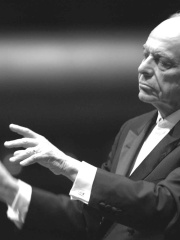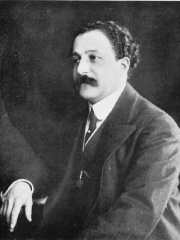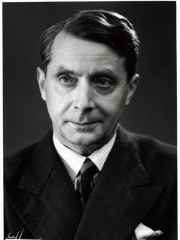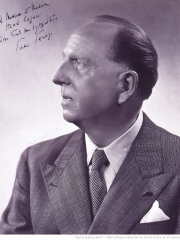



The Most Famous
CONDUCTORS from France
This page contains a list of the greatest French Conductors. The pantheon dataset contains 128 Conductors, 5 of which were born in France. This makes France the birth place of the 11th most number of Conductors behind Czechia, and Poland.
Top 5
The following people are considered by Pantheon to be the most legendary French Conductors of all time. This list of famous French Conductors is sorted by HPI (Historical Popularity Index), a metric that aggregates information on a biography's online popularity.

1. Lorin Maazel (1930 - 2014)
With an HPI of 70.44, Lorin Maazel is the most famous French Conductor. His biography has been translated into 39 different languages on wikipedia.
Lorin Varencove Maazel (; March 6, 1930 – July 13, 2014) was an American conductor, violinist and composer. He began conducting at the age of eight and by 1953 had decided to pursue a career in music. He had established a reputation in the concert halls of Europe by 1960 but his career in the U.S. progressed far more slowly. He served as music director of The Cleveland Orchestra, Orchestre National de France, Pittsburgh Symphony Orchestra, Bavarian Radio Symphony Orchestra, and the New York Philharmonic, among other posts. Maazel was well regarded in baton technique and had a photographic memory for scores. Described as mercurial and forbidding in rehearsal, he mellowed in old age.

2. Pierre Monteux (1875 - 1964)
With an HPI of 63.50, Pierre Monteux is the 2nd most famous French Conductor. His biography has been translated into 25 different languages.
Pierre Benjamin Monteux (pronounced [pjɛʁ mɔ̃.tø]; 4 April 1875 – 1 July 1964) was a French (later American) conductor. After violin and viola studies, and a decade as an orchestral player and occasional conductor, he began to receive regular conducting engagements in 1907. He came to prominence when, for Sergei Diaghilev's Ballets Russes company between 1911 and 1914, he conducted the world premieres of Stravinsky's The Rite of Spring and other prominent works including Petrushka, The Nightingale, Ravel's Daphnis et Chloé, and Debussy's Jeux. Thereafter he directed orchestras around the world for more than half a century. From 1917 to 1919 Monteux was the principal conductor of the French repertoire at the Metropolitan Opera in New York. He conducted the Boston Symphony Orchestra (1919–24), Amsterdam Concertgebouw Orchestra (1924–34), Orchestre Symphonique de Paris (1929–38) and San Francisco Symphony (1936–52). In 1961, aged eighty-six, he accepted the chief conductorship of the London Symphony Orchestra, a post which he held until his death three years later. Although he was known for his performances of the French repertoire, his chief love was the music of German composers, above all Brahms. He disliked recording, finding it incompatible with spontaneity, but he nevertheless made a substantial number of records. Monteux was well known as a teacher. In 1932 he began a conducting class in Paris, which he developed into a summer school that was later moved to his summer home in Les Baux in the south of France. After moving permanently to the US in 1942 and taking American citizenship, he founded a school for conductors and orchestral musicians in Hancock, Maine. Among his students in France and America who went on to international fame were Lorin Maazel, Igor Markevitch, Neville Marriner, Seiji Ozawa, André Previn and David Zinman. The school in Hancock has continued since Monteux's death.

3. Charles Munch (1891 - 1968)
With an HPI of 62.33, Charles Munch is the 3rd most famous French Conductor. His biography has been translated into 21 different languages.
Charles Munch (French pronunciation: [ʃaʁl mynʃ]; born Karl Münch; 26 September 1891 – 6 November 1968) was an Alsatian French symphonic conductor and violinist. Noted for his mastery of the French orchestral repertoire, he was best known as music director of the Boston Symphony Orchestra.

4. Jean Martinon (1910 - 1976)
With an HPI of 59.13, Jean Martinon is the 4th most famous French Conductor. His biography has been translated into 20 different languages.
Jean Francisque-Étienne Martinon (also known as Jean Martinon (French pronunciation: [ʒɑ̃ maʁtinɔ̃]); 10 January 1910 – 1 March 1976) was a French conductor and composer.

5. Paul Paray (1886 - 1979)
With an HPI of 56.41, Paul Paray is the 5th most famous French Conductor. His biography has been translated into 15 different languages.
Paul Marie-Adolphe Charles Paray (French: [pɔl paʁɛ]; 24 May 1886 – 10 October 1979) was a French conductor, organist and composer. After winning France's top musical award, the Prix de Rome, he fought in the First World War and was a prisoner of war for nearly four years. He held a succession of chief conductorships, including those of the Lamoureux and Colonne Orchestras in Paris and the Monte-Carlo Philharmonic Orchestra in Monaco. For ten years from 1952 he was chief conductor of the Detroit Symphony Orchestra, with which he made a celebrated series of recordings for Mercury Records' "Living Presence" series, many of which have been digitally released in the 21st century.
People
Pantheon has 5 people classified as French conductors born between 1875 and 1930. Of these 5, none of them are still alive today. The most famous deceased French conductors include Lorin Maazel, Pierre Monteux, and Charles Munch.
Deceased French Conductors
Go to all RankingsLorin Maazel
1930 - 2014
HPI: 70.44
Pierre Monteux
1875 - 1964
HPI: 63.50
Charles Munch
1891 - 1968
HPI: 62.33
Jean Martinon
1910 - 1976
HPI: 59.13
Paul Paray
1886 - 1979
HPI: 56.41
Overlapping Lives
Which Conductors were alive at the same time? This visualization shows the lifespans of the 5 most globally memorable Conductors since 1700.

